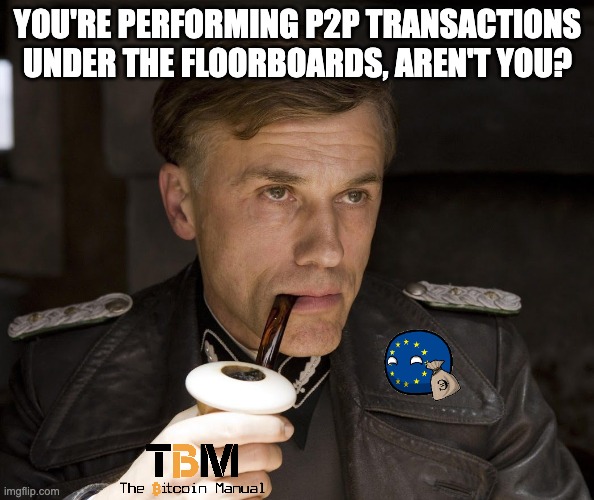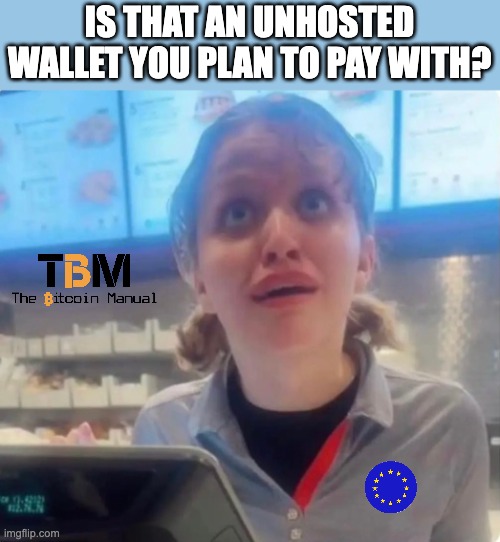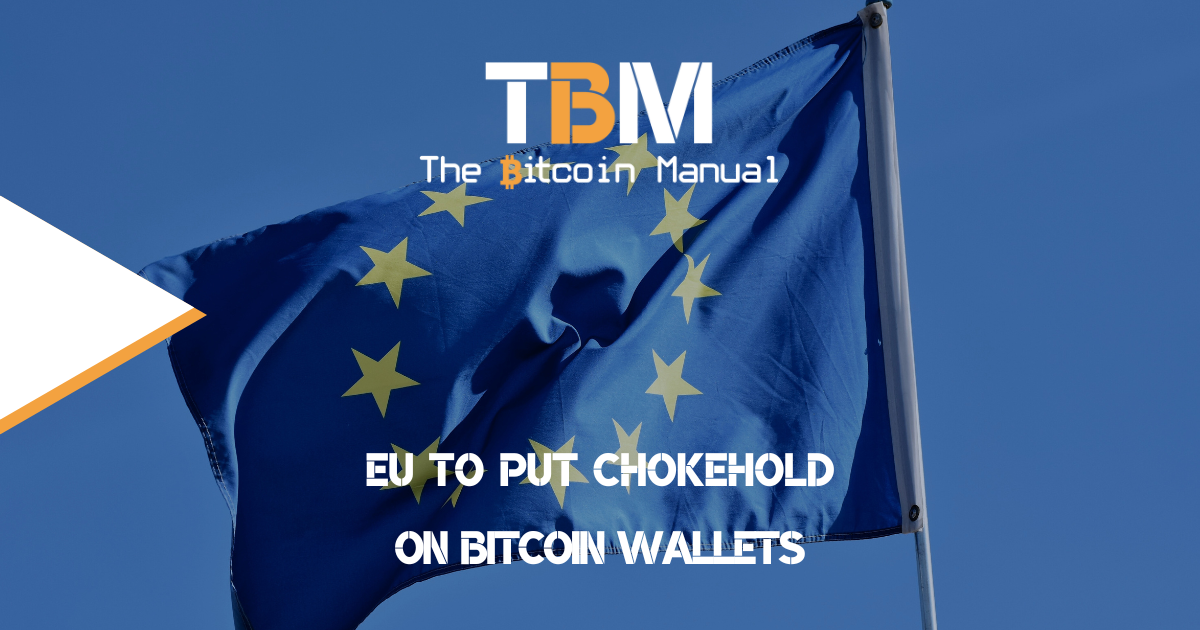Just when you thought Bitcoin was on the up, that the suits would finally give in with the rollout of the US spot ETF, and the price would be free to melt faces, the FUD makes a return, this time from the European Union (EU).
The EU has taken a significant step towards regulating the Bitcoin market, claiming to combat money laundering. To keep those pesky criminals from doing things that are already illegal, all EU citizens have to do is accept a small erosion of personal freedom.
The new Anti-Money Laundering (AML) legislation has been approved to restrict anonymous transactions involving Bitcoin wallets (and cryptocurrency, but who cares about that?).
This latest regulation limits cash transactions and bans all anonymous “cryptocurrency” transactions between two on-chain wallets or L2 wallets where a regulated custodian is not involved. If you hold Bitcoin in a wallet where you hold the private keys and transfer it to another user who holds private keys or even uses a blinded custodian, you’re breaking the law.

The new ban targets Bitcoin, Stablecoins, altcoins and even poor old cash. It also makes any cash transaction over €10,000 and any anonymous cash transaction over €3,000 illegal. Yes, cash is legal tender, but only up to a certain amount.
Make it make sense, EU.
What’s banned?
According to a Twitter post by Patrick Breyer, a member of the European Parliament for the Piratenpartei Deutschland (Pirate Party of Germany), a “majority of the EU Parliament’s lead committees” approved the new AML laws on March 19.
🇩🇪 Von EU-Ausschuss beschlossen:
— Patrick Breyer #JoinMastodon (@echo_pbreyer) March 21, 2024
🚫Verbot von Barzahlungen über 10.000 €
🆔Verbot anonymer Barzahlungen über 3.000 €
₿ Verbot anonymer Kryptozahlungen an hosted wallets selbst bei Kleinstbeträgen
Das bedeutet Krieg gegen das Bargeld und schleichende finanzielle Entmündigung –… pic.twitter.com/mI7AlDslqY
The new rules target anonymous transactions made through private key-hosted wallets or wallets provided by third-party services like exchanges. Under the new legislation, any cryptocurrency transaction, regardless of amount, will require user identification through these platforms.
In a press release after the lead committees approved the legislation, Breyer outlined why he opposed the bill, claiming it compromises individuals’ economic independence and financial privacy.
“This EU war on cash will have nasty repercussions! For thousands of years, societies around the world have lived with privacy-protecting cash. With the creeping abolition of cash, there is a threat of negative interest rates and the risk of banks cutting off the money supply at any time. Dependence on banks is increasing at an alarming rate. This kind of financial disenfranchisement must be stopped.”
– Patrick Breyer
Why the change?
The EU is concerned about the potential for cryptocurrencies to be used for illicit activities due to their anonymity. These regulations are significant targets of money laundering and terrorist financing. Yes, this particular use case means everyone has to fall into line; for the greater good, we need to flatten the curve of money laundering.
The regulation mandates enhanced monitoring of cryptocurrency asset transfers and requires digital asset-related businesses to implement rigorous due diligence practices to deter money laundering, necessitating thorough customer background checks.
The legislation also emphasises the need for detailed records of actual beneficiaries, aiming to disclose the real owners or controllers of legal entities. This initiative will compel a broad spectrum of entities, including banks, real estate firms, and cryptocurrency businesses, to intensify their customer verification processes.
What does this mean for Bitcoin users?
We don’t yet know the extent of the implementation, how exchanges will handle it, how app stores will provide software to EU users or the penalties involved, but we can make some assumptions.
If you use a hosted wallet within the EU, you can expect to go through some form of identity verification process in the future. This might involve providing personal information like your name, address, and ID documentation.
As with any regulation, it takes time to implement, giving you time to get your house in order and prepare your private stash of Bitcoin. The new legislation is expected to roll out within three years, giving you the next halving and a bit to secure a bag of filthy criminal anonymous Satoshis without too many issues.

Are there loopholes?
The effectiveness of these regulations is a subject of debate. Some argue that criminals will simply switch to decentralised exchanges or self-custody wallets, and these regulations would not stop them; they’re already planning on criminal activity, so why would a few more regulations deter them?
It never did in the past.
As for the man on the street, the average pleb, the global nature of Bitcoin makes enforcement across borders a challenge. Even if exchanges are limited or shut down within the EU, it isn’t impossible to remit money overseas through fintech apps or banking services and exchange those funds for P2P Bitcoin or Stablecoins with people from other countries.
Once you’re on those on-chain rails, stopping people from exchanging value or conducting anonymous commerce is nearly impossible. EU Citizens could also create bank accounts within other countries and conduct their transactions through jurisdictional arbitrage.
It becomes a game of wack-a-mole and comes down to how motivated you are to get money out of the prying eyes of the EU.
The future of cryptocurrency in the EU
The EU’s move reflects a growing trend of governments seeking to regulate cryptocurrency. While this may inconvenience users, it’s also a sign of Bitcoin’s growing importance and potential for mainstream adoption and the fear of citizens having financial sovereignty or an easy exit from future currency debasement.
The latest EU regulations are already starting to see companies fall into compliance. Last week, leading exchange OKX announced the delisting of USDT trading pairs in the region, following the rules imposed on stablecoins by the forthcoming MiCA regulations.
Hoarding users into a honeypot
One concern is that regulation like this could lay the groundwork for pushing paper Bitcoin on investors as the lesser evil. Instead of buying and holding real Bitcoin and dealing with the illegalities that come with it, funnelling users to purchase regulated Bitcoin ETFs might become the preferred route for more first-time investors.
These ETFs will give users exposure to price appreciation, but they also open them up to continued regulation, changes in taxes, and changes in management fees and offer them control over the underlying.
If a government were to issue a 6102 order, ETF Bitcoin would be easy to confiscate, forcing you to settle in cash, take a haircut on your Bitcoin, or, worse, get nothing for your allocation.
As opposed to on-chain Bitcoin, where you can take it anywhere in the world and sell it for the best market price available, confiscation becomes complicated as it would require authorities to physically track you down and force you to hand over the keys.
The luxuries of the third world
As someone who lives in the banana republic of South Africa, I feel the pain of inflation, but I feel pretty safe from financial and regulatory overreach due to our government’s level of incompetence; rollouts of this kind would be near impossible, so we get to enjoy the freedom of anonymous transactions.
Like many developing nations, ours has a large, cash-dependent grey market. That market is slowly starting to adopt alternative private payments in the form of Bitcoin and Stablecoins.
As countries worldwide live in a relatively high-interest rate environment, debt burdens increase, and the resulting unrest frays society, we will see more extreme measures on the rise. As soft defaults through higher rates of debasement encourage citizens to seek alternative stores of value, shutting those gates becomes more of a priority.
Governments that have the power will use it, and EU citizens will need to come to terms with living on the edge of the law and exercising civil disobedience or face the continued currency debasement head-on.
The silver lining in these overreaches is that they keep eroding the blind trust many “rule-of-law” societies have in their institutions and rules. At some point, Europeans need to feel comfortable living as many do in third-world Asia, Africa, and South America: at the edge of the law and “decency.”




